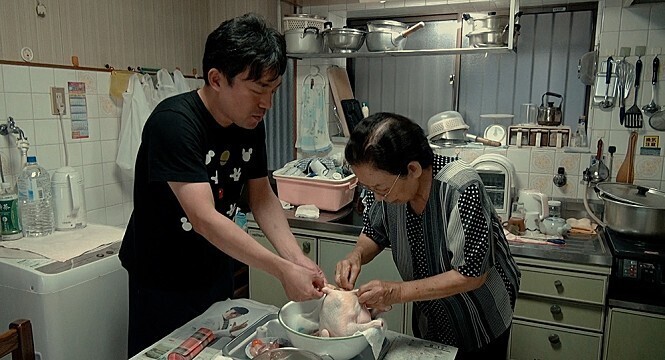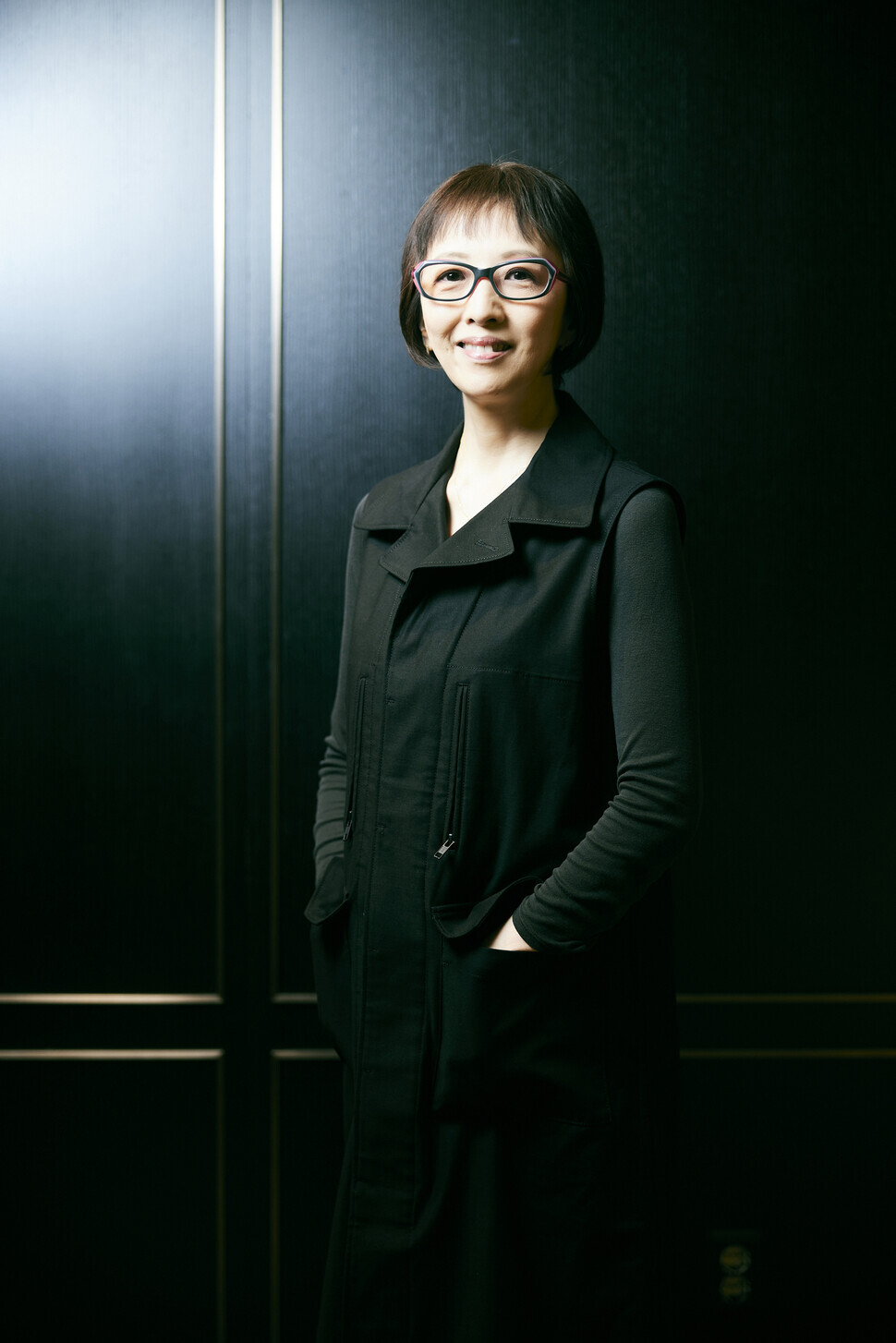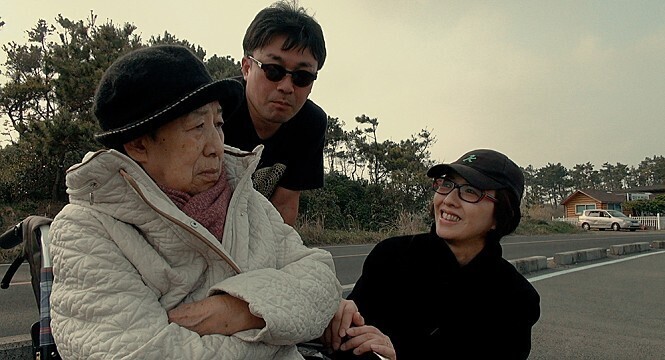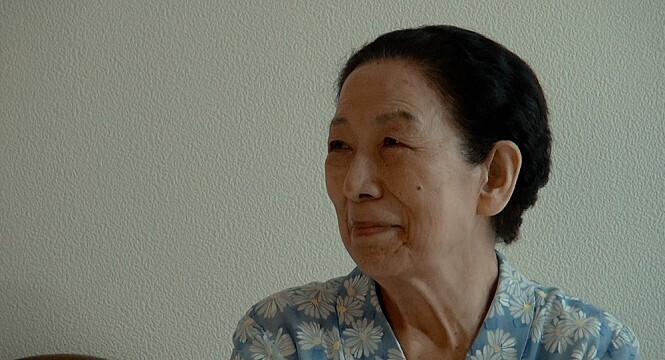hankyoreh
Links to other country sites 다른 나라 사이트 링크
Untold memories of Jeju massacre shared over a mother’s homemade soup

With her documentaries “Dear Pyongyang” (2006) and “Sona, the Other Myself” (2011), Yang Yong-hi focused on the stories of her Japanese-raised older brothers who left for North Korea, as well as the family they left behind. Now, ten years later, she returns with the new work “Soup and Ideology,” which debuted on Oct. 20.
The “soup” in the title is a reference to the chicken soup Yang’s mother cooks for the new bridegroom her daughter brings home. The “ideology” relates to the mother’s buried memories of the Jeju April 3 Incident. The culmination of Yang’s “family trilogy” focuses both on a new family member taking the place of the departed father and on moments from the mother’s life that have been erased.
The Hankyoreh spoke with Yang Yong-hi on Oct. 12 at Artnine, a cinema in Seoul’s Dongjak District.
“Ever since I was a child, my mother would often talk about how ‘cruel’ [South] Korea was,” she recalled.
“At the time, I thought she was just being narrow-minded. But as she talked more and more about it and the pieces fit together, I came to see why she felt compelled to say that and why she regarded North Korea with feelings of hope.”

After her father’s death in 2009, Yang went back and forth between Tokyo and Osaka caring for her mother, who was in and out of the hospital at the time. She did not initially set out to record her mother’s eyewitness accounts in the camera’s lens.
“She kept mentioning things about it, but there was so little information that I never had any thought of turning it into a feature-length film,” she explained. “I thought I could keep some kind of a family record, or maybe make a short out of it.”
“I also fought a lot with her over money, as she kept sending money to [her sons in] North Korea rather than spending it on her own hospital costs,” she added.
The filming process was slow going early on, but it reached a turning point when the mother’s “Japanese son-in-law” (the one Yang’s father had forbidden her to marry) came to see the mother to ask for permission to marry her daughter.
The mother offered him some of her chicken soup, which she had spent a long time boiling up. During his later visits to the house, the son-in-law began asking questions about the events of April 3 in Jeju, and the mother started to share a long story about her home island, and about the circumstances that drove her to board a smuggling ship with her two young siblings at the age of 15.
“Everything I heard I was learning about for the first time: how my mother had had a fiance back on Jeju Island, her memories of risking her life transporting gasoline for him, and how he and her family and neighbors had been brutally killed,” Yang recalled.
The director had actually heard about the post-liberation massacres on Jeju from the historian husband of one of her teachers back when she was studying in the US in the late 1990s.
“At the time, I’d told him that he had gotten it wrong, that he must have been confusing it with what happened in Gwangju in 1980. It wasn’t until nearly 20 years later that I learned that it had really happened, and that my mother was a survivor,” she said.

The film also includes the director’s 2018 visit to Jeju with her mother to attend a commemorative ceremony for the victims on the 70th anniversary of the outbreak of the Jeju April 3 Incident. For the mother, it was her first visit home since her departure.
“My mother was scared to come to Korea,” Yang explained. “She didn’t believe me when I told her that it was a democracy now, that the government had acknowledged Jeju April 3 and that there was even a peace park built for it.”
In her childhood, Yang had seen her mother as ignorant, with her firm faith in North Korea. But she came to realize that as someone who had been essentially chased away from Korea at gunpoint, and who had suffered decades of discrimination in Japan, her mother truly wanted to preserve the “homeland in her heart.” People who have endured difficult experiences need faith in something to survive; for Yang’s mother, she realized, faith in North Korea filled that role.

After her difficult experience of returning to Jeju, the mother was unable to talk about it. The symptoms of Alzheimer’s disease that had gradually set in had rapidly begun to deteriorate.
“[The situation] came across like a promise from my mother. She was saying, ‘I’ve told you all there is to say, so now it’s up to you. As for me, I’m going to forget it all,’” the director said. Her mother, Kang Jong-hi, passed away in January of this year.
Accompanying Yang on her visit was her husband Kaoru Arai. When asked how he felt about appearing in the film, he laughed and said, “I’ve been ready for it ever since I married a documentary filmmaker.”
“The history of Jeju April 3 bears connections with Japan’s responsibility for colonization,” he added. “I hope that through this film, Japanese people can see how this isn’t just another country’s history, but a past that connects with their own grandmothers and grandfathers,” he added.
Coinciding with the documentary’s release is the publication of “I Turn the Camera Off before Using It” (Maum Sanchaek), an essay collection by Yang that includes off-camera stories that she was not able to put on the screen.
By Kim Eun-hyoung, senior staff writer
Please direct questions or comments to [english@hani.co.kr]

Editorial・opinion
![[Editorial] Perilous stakes of Trump’s rhetoric around US troop pullout from Korea [Editorial] Perilous stakes of Trump’s rhetoric around US troop pullout from Korea](https://flexible.img.hani.co.kr/flexible/normal/500/300/imgdb/original/2024/0509/221715238827911.jpg) [Editorial] Perilous stakes of Trump’s rhetoric around US troop pullout from Korea
[Editorial] Perilous stakes of Trump’s rhetoric around US troop pullout from Korea![[Guest essay] Preventing Korean Peninsula from becoming front line of new cold war [Guest essay] Preventing Korean Peninsula from becoming front line of new cold war](https://flexible.img.hani.co.kr/flexible/normal/500/300/imgdb/original/2024/0507/7217150679227807.jpg) [Guest essay] Preventing Korean Peninsula from becoming front line of new cold war
[Guest essay] Preventing Korean Peninsula from becoming front line of new cold war- [Column] The state is back — but is it in business?
- [Column] Life on our Trisolaris
- [Editorial] Penalties for airing allegations against Korea’s first lady endanger free press
- [Editorial] Yoon must halt procurement of SM-3 interceptor missiles
- [Guest essay] Maybe Korea’s rapid population decline is an opportunity, not a crisis
- [Column] Can Yoon steer diplomacy with Russia, China back on track?
- [Column] Season 2 of special prosecutor probe may be coming to Korea soon
- [Column] Park Geun-hye déjà vu in Yoon Suk-yeol
Most viewed articles
- 1Behind-the-times gender change regulations leave trans Koreans in the lurch
- 260% of young Koreans see no need to have kids after marriage
- 3Family that exposed military cover-up of loved one’s death reflect on Marine’s death
- 4[Guest essay] Preventing Korean Peninsula from becoming front line of new cold war
- 5Yoon’s revival of civil affairs senior secretary criticized as shield against judicial scrutiny
- 6Japan says its directives were aimed at increasing Line’s security, not pushing Naver buyout
- 7‘Free Palestine!’: Anti-war protest wave comes to Korean campuses
- 8Korean president’s jailed mother-in-law approved for parole
- 9S. Korean first lady likely to face questioning by prosecutors over Dior handbag scandal
- 10Marines who survived flood that killed colleague urge president to OK special counsel probe